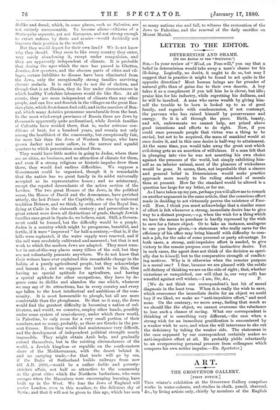LETTER TO THE EDITOR.
DETERMINISM AND SH. AWE [TO THE EDITOR OF THE " SPECTATOR."] Sta,—In your review of "Mind, on Free-will," you say that a belief in determinism would take away a man's shame for his ill-doing. Logically, no doubt, it ought to do so, but may I suggest that in practice it might be found to act quite in the opposite direction? Most human beings are far prouder of natural gifts than of gains due to their own deserts. A boy takes it as a compliment if you tell him he is clever, but idle; praise him for his industry, while regretting his dullness, and he will be insulted. A man who earns wealth by giving him- self the trouble to be born is looked up to as of good family, and regards with condescension, if not contempt, the parvenu who has raised himself by perseverance and energy. So it is all through the piece. Birth, beauty, and wit, endowments we cannot help, are prized above good intentions and efforts to do right. Now, if you could once persuade people that virtue was a thing to be envied, but not to be acquired, the mass of mankind would at once desire it, and in this case desire is half-way to attainment. At the same time, you would take away the great zest which evil-doing gets as an assertion of wilfulness. If a man felt that in plunging into vice he was not asserting his own choice against the pressure of the world, but simply exhibiting him- self as an inferior animal, most of the pleasure of wickedness would be gone. It seems, then, not improbable that a sincere and general belief in Determinism would make practice approach more nearly to the ruling standard of morals than at present. How far the standard would be altered is a question too large for my letter, or for me.
As I have taken up my pen, perhaps you will allow me to remark on another argument in the same article, that the conscious effort made in deciding to act virtuously proves the existence of Free- will. Now, I think you must acknowledge that a similar sense of effort is felt whenever a strong, immediate desire has to give way to a distant purpose,—e.g, when the wish for a thing which we have the means to purchase is hardly repressed by the wish to save for a future object. Or to fake an instance, analogous to one you have given,—a statesman who really cares for the efficiency of his office may bring himself with difficulty to com- mit a job, for the sake of some personal or party advantage. In both cases, a strong, anti-impulsive effort is needed, to give victory to the remote purpose over the instinctive desire. Yet in such cases, the agent does not think of the decision as speci- ally due to himself, but to the comparative strength of conflict- ing motives. Why is it otherwise when the remoter purpose is a moral one ? I fear, because we are pleased with the subtle self-flattery of thinking we are on the side of right; that, whether victorious or vanquished, our will (that is, our very self) has
wrestled against evil wishes.—I am, Sir, &c., F.
We do not think our correspondent's last bit of moral diagnosis in the least true. When it is really the wish to save, which overcomes the immediate desire for an object we could buy if we liked, we make no " anti-impulsive effort," and need none. On the contrary, we move away, feeling that much as we should like the object, we cannot overcome the reluctance to lose such a chance of saving. What our correspondent is thinking of is something very different, —the case when a strong wish for an immediate gratification is encountered by a weaker wish to save, and when the will intervenes to eke out the deficiency by taking the weaker side. The statesman in the case supposed by our correspondent certainly makes no anti-impulsive effort at all. He probably yields reluctantly to an overpowering personal pressure from colleagues which conquers his own nobler impulse.—En. Spectator.]


































 Previous page
Previous page